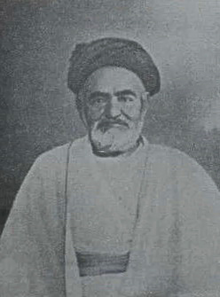Ashraf Gilani
Seyed Ashrafedin Hosseini Gilani | |
|---|---|
 Ashrafedin in his last years of life | |
| Personal details | |
| Born | 1870 Qazvin , Iran |
| Died | 1934 Tehran , Iran |
| Occupation | poet, writer |
| Profession | Editor of newspaper "Naseem - e- Shomal |
Seyed Ashrafedin Hosseini Gilani, (born in 1870 in Qazvin, died in 1934 in Tehran) was a combatant poet in Iran’s constitutional revolution and the editor of the newspaper” Nasim-e-Shomal”. (Northern Breeze).[1]
Early life
Ashrafedin lost his father when he was only six months old. His Paternal heritage was usurped. This brought him and his family into extreme poverty.
Ashrafedin finished his elementary education in his home town then went to Najaf (Iraq) for religious education. He came back to Iran after 5 years and continued his studies there.
It was in 1906 while living in Rasht, (north of Iran) that he got to know the leaders of the constitutional revolution and started publishing the weekly newspaper, Naseem- e - Shomal.
Constitutional Revolution
The revolution was suppressed at its early stages. After the bombardment and dissolution of the parliament by Mohammad Ali Shah Qajar, Ashrafedin fled to Eshtehard, in the suburb of capital Tehran. A few months later when he returned to Rasht he became influenced by the leaders of the Social-Democrats of the Caucasus. This effect was later visible in the Naseem-e- Shomal's articles.[2]
Death


Ashrafedin was finally arrested for his anti government activities. The exact date of his arrest in unknown. As it was announced in his newspaper, Naseem-e - Shomal, Ashrafedin died on 20 March 1934.[3] He was buried in a cemetery near the city of Rey south of the capital Tehran.The newspaper Naseem-e- Shomal did not last long after his death.[4]
